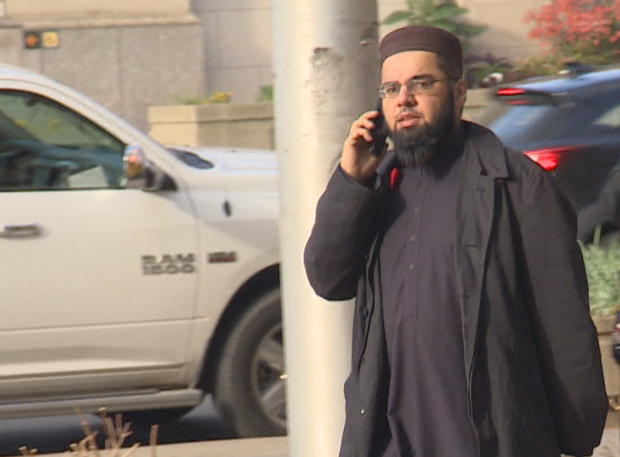2 men defrauded Shariah-compliant mortgage-holders of millions of dollars, Crown tells trial
The trial of two men charged with defrauding Muslim homeowners got underway in Toronto courtroom this week with the Crown accusing the defendants of bilking their clients of millions of dollars.
Omar Kalair and co-accused Yusuf Panchbhaya are standing trial in Ontario Superior Court on numerous charges, including fraud, theft over 5,000 dollars, and laundering the proceeds of crime. They have both pleaded not guilty.
This is Kalair's second trial on these charges. His first was adjourned in November 2017 after he fired his lawyer.
Federal prosecutor Damien Frost told Madame Justice Jane Ferguson, who is presiding over the judge-alone trial, that Kalair's company United Muslim Financial (UMF) had "failed fairly spectacularly" by the time it went into receivership in October 2011.
Before that, it had been providing "Shariah compliant" mortgages to Muslim homeowners since 2004.
In the Islamic faith, Frost explained, interest is to be avoided, so UMF required homeowners to pay an extra fee as "profit," instead of interest on a loan.
In his opening statement, Frost alleged in the year leading up to the UM Financial's bankruptcy, Kalair had been pocketing money from the company's account for his own personal use.
And just weeks before UM Financial went into receivership on Oct. 7, 2011, Frost told the court, Kalair had cleaned out almost all the money Muslim homeowners had provided to pay down their mortgages.
The money that remained in UMF's account was supposed to go to Central 1 Credit Union — it that had been financing Kalair's mortgages and was his main creditor.
When the court appointed receiver, accounting firm Grant Thornton LLP Canada, took control of the UMF's account in October 2011 "almost nothing was left," said Frost.

Co-defendant Yusuf Panchbhaya is an Imam who chaired a board of clerics that had sanctioned Kalair's mortgages as Shariah compliant.
The Crown alleges Kalair and Panchbhaya worked together to unlawfully take millions of dollars in mortgage money from UMF's account just before the company went into receivership. They then collaborated to buy millions of dollars in gold and silver bullion.
When Grant Thornton found out what happened, Frost said, the firm got a court order demanding Kalair and Panchbhaya return the precious metals.
Panchbhaya returned the silver, but Frost said "the gold bullion disappeared and has never been recovered." The court heard almost $2 million worth of gold remains outstanding.
The Crown further alleges Panchbhaya's board of Muslim clerics formed a new company called Multicultural Consultancy of Canada (MCC), after the gold and silver was bought.
MCC sent an invoice to UMF demanding millions of dollars in payment for five rulings that determined the company's mortgages were shariah compliant. This payment was something the board had never demanded in the past, said Frost.
Scotiabank manager saw 'red flags'
Retired Scotiabank manager Michael Durst was the first witness crown witness to testify.
He told the court on Aug 30, 2011 Kalair told him he wanted to buy about a million dollars in gold bars. The money was in Durst's local Scotiabank branch on Don Mills Road where UM Financial had its account.
Durst said he thought the request was unusual from someone who was financing Shariah-compliant mortgages. He told Kalair his local branch didn't carry gold bullion and suggested Kalair make the purchase at the main Scotiabank branch at Scotia Plaza.
The court saw Scotiabank wire transfer documents that showed $878,514.87 was debited from UMF's account on Aug. 30, 2011, after Kalair had bought the gold.
Durst testified Kalair returned to the branch the next day and wanted to buy another large amount of gold. He told the court he became suspicious because UMF was not a precious metal company.
Durst said he asked Kalair why he wanted to buy so much of the precious metal. Durst testified Kalair told him one of UM Financial's investors wanted to take advantage of rising gold prices.The retired bank manager told the court the investor was never named.

Durst said because of "red flags" being raised by the transaction, he filled out a "Unusual Transaction Report" and told Kalair "we would not be selling him the gold."
Durst did admit he told Kalair "there were other companies in the city that could sell him precious metals ... but we were not prepared to supply it."
Durst also testified he was not aware that at the time there had been an application to put UMF into receivership. Had he known, Durst said the bank would "likely have frozen the account."
Durst testified he continued to follow UMF's bank account at his branch. On Sept. 1, 2011 Durst noticed more than $900,000 had been wired to Bendix, a foreign exchange company that sells precious metals. A week later on Sept. 8, 2018, another $300,000 was wired to Bendix from the same account.
Two witnesses from Bendix testified Friday on those dates in September Kalair purchased a total of 17 kilograms of gold bars, 15-100 oz silver bars and 5,800 1 oz silver coins from Bendix. It added up to approximately $1.3 million.
Frost told the court he plans to call an expert witness in money laundering later in the trial. He expects the witness will explain how turning money into precious metals "makes it almost impossible to trace, locate and recover."
The trial continues Monday.

